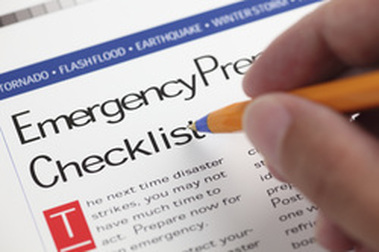Emergency Preparedness Checklist
Emergency Preparedness is a Plan of Action you could take during distress. An emergency plan is a list of protocols, responses and solutions to hypothetical situations that are both likely to occur and those that are unforeseen. We encourage you to set up a plan for yourself and your family, ready.gov offers a great guideline on how to start. Here you will information in regards to animals, because your home emergency plan should always include your pets! Here we offer some suggestions as to topics to explore when considering your pets in your emergency preparedness plans.
1. Keep ID tags on your pets at all times! Click here to receive a free tag through donation.
2. Keep on top of your Emergency Preparedness Plans.
3. Build an Emergency Preparedness kit and a Pet First Aid kit and Learn how to use them!
4. Carry hard copies your veterinarians card and the nearest 24 hour vets information with you. This could be your vehicle, your purse, your wallet. Some else may need to use them or your phone's battery could die.
5. Is your veterinarians information in your cell phone, along with friends, family that could help?
6. Is your veterinarians and/or 24 hour vets address information in your GPS?
7. Notify your veterinarian as to your wishes and financial limits in advance, in case someone other than yourself takes your pet to the clinic.
8. Have you chosen an alternate pet parent to take over your responsibilities if you are unavailable to help them yourself? Your Pet Care Trust is a list of your emergency contact information for both short and long term assistance.
9. Consider teaching your pet obedience games that can help prepare them for emergencies.
10. Practice, obedience, safety games and bandaging it brings familiarity to a situation. The day something happens is no time at all to introduce a new item to your pet, reduce stress and anxiety for both you and your pet by being prepared!
2. Keep on top of your Emergency Preparedness Plans.
3. Build an Emergency Preparedness kit and a Pet First Aid kit and Learn how to use them!
4. Carry hard copies your veterinarians card and the nearest 24 hour vets information with you. This could be your vehicle, your purse, your wallet. Some else may need to use them or your phone's battery could die.
5. Is your veterinarians information in your cell phone, along with friends, family that could help?
6. Is your veterinarians and/or 24 hour vets address information in your GPS?
7. Notify your veterinarian as to your wishes and financial limits in advance, in case someone other than yourself takes your pet to the clinic.
8. Have you chosen an alternate pet parent to take over your responsibilities if you are unavailable to help them yourself? Your Pet Care Trust is a list of your emergency contact information for both short and long term assistance.
9. Consider teaching your pet obedience games that can help prepare them for emergencies.
10. Practice, obedience, safety games and bandaging it brings familiarity to a situation. The day something happens is no time at all to introduce a new item to your pet, reduce stress and anxiety for both you and your pet by being prepared!
Are you ready to get started?

